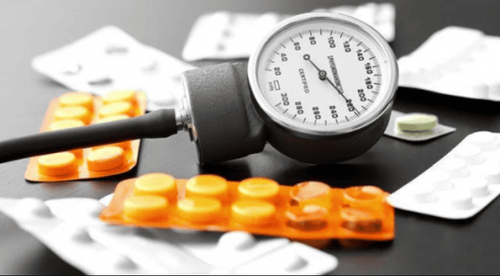This is an automatically translated article.
Zestoretic 20 is indicated for patients with mild to moderate hypertension who are on stable treatment with the same drug alone in each dose ratio 20 mg/12.5 mg. Use drugs as prescribed by your doctor to ensure safety and effectiveness of treatment
1. What is Zestoretic?
Zestoretic 20 is manufactured by AstraZeneca Pharmaceutical Co., Ltd. Lisinopril and Hydrochlorothiazide are drugs that are used to treat primary hypertension.
Zestoretic drug ingredients:
Active ingredients: Tablets contain lisinopril dihydrate (equivalent to 20 mg of anhydrous lisinopril) and 12.5 mg of hydrochlorothiazide Ph.Eur. Excipients: mannitol, calcium hydrogen phosphate dihydrate, corn starch, pregelatinized corn starch, magnesium stearate.
2. Uses of the drug Zestoretic 20 mg
Zestoretic is indicated for the treatment of patients with mild to moderate hypertension who are on stable therapy with the same drug at each dose rate of 20 mg/12.5 mg.Indications for use of Zestoretic 20 mg:
Zestoretic is indicated for use in the treatment of patients with primary hypertension. Pharmacodynamics:
Zestoretic drug 20mg has the effect of treating high blood pressure and diuretic. Lisinopril and hydrochlorothiazide have been used in the treatment of hypertension when their co-administration has synergistic or distinct effects. Lisinopril is an angiotensin-converting enzyme (ACE) inhibitor. Inhibition of Angiotensin II production causes vasodilation and lowers blood pressure. Hydrochlorothiazide is a diuretic and antihypertensive. Taking this drug alone increases renin excretion. Concomitant administration of Lisinopril and hydrochlorothiazide resulted in a greater reduction in blood pressure. Lisinopril slightly attenuated the effects of potassium loss with hydrochlorothiazide. Pharmacokinetics:
Absorption: Following oral administration of a single dose of Lisinopril, peak serum concentrations of lisinopril reached 7 hours. Based on urinary excretion, absorption of lisinopril is approximately 25% of the dose, with inter-patient variability (6-60%). Food does not affect the gastrointestinal absorption of lisinopril. Distribution: Lisinopril is not bound to serum proteins other than blood angiotensin-converting enzyme. Studies in rats have shown that lisinopril crosses the blood-brain barrier poorly. Metabolism and Elimination: Lisinopril is not metabolized and is excreted unchanged in the urine. With repeated dosing, lisinopril has a cumulative half-life of 12 hours. The plasma elimination half-life varies from 5.6 to 14.8 hours. Hydrochlorothiazide is not metabolized, but is rapidly eliminated by the kidneys; At least 61% of an orally administered dose is eliminated within the first 24 hours. Hydrochlorothiazide crosses the placental barrier but not the blood brain barrier. Multiple dose combinations of lisinopril and hydrochlorothiazide had no or very little effect on the bioavailability of both drugs. The combination tablet is bioequivalent to the concomitant use of two separate drugs. Hepatic Impairment: Damage to liver function in patients with cirrhosis reduces the absorption of lisinopril (approximately 30%). Patients with renal impairment: Renal impairment reduces the elimination of lisinopril, which is clinically significant only when the glomerular filtration rate is less than 30 ml/min. Patients with Heart Failure: Compared with healthy subjects, patients with heart failure had a greater exposure to lisinopril (AUC), but absorption was reduced by approximately 16% based on the amount of drug in the urine.
3. Dosage of Zestoretic 20 mg
Usage: Take orally.
Dosage of Zestoretic:
The usual dose is 1 tablet, used once a day. As with other once-daily medications, Zestoretic 20 should be taken at the same time of day. If taking the drug regularly from 2-4 weeks without seeing any obvious effects, the patient can increase the dose to 2 tablets, used once a day. Dosage in hypertensive patients with renal impairment: Thiazides are not suitable diuretics for patients with renal impairment and are ineffective at creatinine clearance ≤ 30 mL/min (moderate renal impairment). to heavy). Zestoretic should not be used as initial therapy in patients with renal impairment. Can be used in patients with creatinine clearance between 30 mL/min and 80 mL/min, Zestoretic may be used but only after dose adjustment for the individual components of the drug. The starting dose of lisinopril when used alone in patients with mild renal impairment is 5 to 10 mg. Prior treatment with diuretics: Symptomatic hypotension may occur after the initial dose of Zestoretic. This is more likely to occur in patients with hypovolemia and/or electrolyte depletion. Treatment with diuretics should be discontinued 2-3 days prior to Zestoretic administration. Otherwise, treatment with lisinopril alone should be initiated at a dose of 5 mg only. Dosage in Children: Safety and effectiveness in children have not been established. Dosage in the Elderly: Lisinopril with a daily dose range of 20 mg to 80 mg was equally effective in hypertensive elderly patients (≥ 65 years) and in non-hypertensive patients. elderly. In elderly patients with hypertension, lisinopril monotherapy is as effective in reducing diastolic blood pressure as hydrochlorothiazide or atenolol monotherapy. Clinical studies have shown that age has no effect on tolerability of lisinopril. Note: The above dosage is for reference only. The specific dose depends on the condition of each patient and the progression of the disease. Therefore, in order to have a suitable dose, patients need to consult a doctor or pharmacist, to avoid self-medication leading to serious consequences.
4. What to do in case of overdose?
Symptoms of overdose:
There are limited data on overdose in humans. Symptoms associated with an ACE inhibitor overdose include hypotension, circulatory shock, electrolyte disturbances, renal failure, tachypnea, tachycardia, palpitations, dizziness, anxiety, and cough. Symptoms associated with thiazide overdose are increased diuresis, cognitive impairment, convulsions, paralysis, cardiac arrhythmias, and renal failure. Overdose treatment:
Slow intravenous infusion of physiological saline solution. If severe hypotension occurs, the patient should be placed in the supine position. Lisinopril can be removed from the circulation by hemodialysis. Place a pacemaker, regularly monitor vital signs, serum electrolytes and creatinine levels. Bradycardia or persistent vagal reactions should be treated symptomatically with atropine. What to do when a dose is missed:
If the patient forgets a dose, take it as soon as possible. However, if it is almost time for your next dose, skip the missed dose and take your next dose at the scheduled time. Note that double the prescribed dose should not be taken.
5. Side effects of the drug Zestoretic
When using Zestoretic 20, patients may experience undesirable effects as follows:
Common side effects:
Mental disorders and nervous system disorders: Dizziness, headache, fainting; Cardiovascular disorders: Postural effects; Respiratory, thoracic and mediastinal disorders; Digestive disorders: Diarrhea, vomiting; Renal and urinary disorders: Renal dysfunction. Some rare side effects:
Mental disorders and nervous system disorders: Paresthesia, dizziness, taste and sleep disturbances, mood swings, depressive symptoms; Cardiovascular disorders: Myocardial infarction or cerebrovascular accident, possibly secondary to excessive hypotension in high-risk patients; Respiratory, thoracic and mediastinal disorders: Rhinitis; Digestive disorders: Nausea, abdominal pain and indigestion; Hepatobiliary disorders: Increased liver enzymes and bilirubin; Skin and subcutaneous tissue disorders: Rash, pruritus; Reproductive system and mammary gland disorders: Impotence; General disorders and local characteristics: Asthenia, fatigue; Laboratory results: Increased blood urea, increased serum creatinine, hyperkalemia. Cases of rare side effects:
Blood and lymphatic system disorders: Decrease in hemoglobin, decrease in hematocrit; Endocrine system disorders: Syndrome of inappropriate antidiuretic hormone secretion; Metabolic and nutritional disorders: Hypoglycemia; Psychiatric and nervous system disorders: Psychiatric disorders, olfactory disturbances; Gastrointestinal disorders Skin and subcutaneous tissue disorders: Hypersensitivity/angioedema (neuroedema of the facial vessels, sutures, lips, tongue, glottis and/or larynx); Renal and urinary disorders: Uremia, acute renal failure; Reproductive system and mammary gland disorders: Gynecomastia; Laboratory results: Hyponatremia ; Very rare side effects:
Subclinical: Hypoglycaemia, hyperuricemia, hyperkalemia or hypokalemia; Increased blood urea nitrogen and serum creatinine, anemia; Hepatobiliary disorders: Hepatitis; Blood and Lymphatic System Disorders: Bone marrow failure, thrombocytopenia, agranulocytosis, hemolytic anemia, lymphadenopathy, autoimmune disease; Respiratory, thoracic and mediastinal disorders: Bronchospasm, sinusitis, bronchitis/eosinophilic pneumonia; Digestive disorders: Pancreatitis, angioedema in the intestine; Skin and subcutaneous tissue disorders: Skin atrophy, toxic epidermal necrolysis, Stevens-Johnson syndrome, erythema multiforme; Renal and urinary disorders: Oliguria, anuria. When experiencing side effects of the drug, the patient should stop using and notify the doctor or go to the nearest medical facility for timely treatment and treatment, to avoid adverse health effects.
6. Notes when using Zestoretic
Contraindications to the use of Zestoretic:
Hypersensitivity to the active ingredients or any excipients contained in the medicinal product; Hypersensitivity to any other ACE inhibitor; Hypersensitivity to any sulfonamide derivatives; History of angioedema with previous ACE inhibitor therapy; Hereditary or idiopathic angioedema; the second or third trimester of pregnancy; Severe renal failure (creatinine ≤ 30 mL/min); Anuria; Severe liver failure; Concomitant use of Zestoretic with aliskiren-containing products is contraindicated in patients with diabetes mellitus or in patients with renal impairment (GFR < 60 ml/min/1.73 m2). Use with caution:
Symptomatic hypotension; Aortic and mitral valve stenosis/hypertrophic cardiomyopathy; Dual blocker of the renin-angiotensin-aldosterone system; Damage to kidney function and kidney transplantation; Hepatic impairment: Patients with altered liver function or advanced liver disease should use caution when using thiazide-containing drugs because minor changes in electrolyte balance can also cause liver damage; Surgery and Anesthesia: In patients undergoing major surgery or receiving anesthetic agents that cause hypotension, lisinopril may prevent angiotensin II formation secondary to compensatory renin release; Endocrine and metabolic effects: The drug reduces glucose tolerance. Dosage adjustment of antidiabetic agents, including insulin, may be necessary; Electrolyte imbalances: Serum electrolyte levels should be checked periodically at appropriate intervals; Hyperkalemia: Patients at risk for hyperkalemia include those with renal impairment, diabetes mellitus or those taking concomitant potassium-sparing diuretics, potassium supplements or potassium-functional salt substitutes, or patients taking other drugs associated with increased serum potassium; Diabetic patients: Blood glucose control should be closely monitored during the first month of ACE inhibitor therapy; Hypersensitivity/Angioedema: Angioedema of the face, extremities, lips, tongue, glottis and/or larynx has been observed rarely in patients treated with ACE inhibitors including Lisinopril. In these cases, lisinopril should be stopped immediately and with reasonable monitoring to ensure complete disappearance of these symptoms before discontinuing monitoring of the patient; Desensitization: Prolonged anaphylactoid reactions may occur; Cough: Typically a dry, persistent cough that resolves on its own when the drug is stopped. Cough has many causes, each cough symptom will have different drug interactions, so patients need to be examined and prescribed the appropriate drug dose by a doctor; Lithium: Not recommended in combination with ACE inhibitors; Anti-doping tests: Drugs containing hydrochlorothiazide may give positive results in anti-doping tests. Ability to drive and use machines: The drug may have mild to moderate effects on the ability to drive and use machines. This is particularly the case when starting or changing the dose and when used with alcohol, but these effects depend on individual patient sensitivities. When driving and operating machinery, care should be taken that the drug may cause dizziness or fatigue; Pregnancy: Because angiotensin-converting enzyme inhibitors cross the placenta, they may interfere with fetal blood pressure regulation. Oliguria, hypotension, oliguria, anuria, and neonatal skull hypoplasia have been reported with angiotensin-converting enzyme inhibitors during the second and third trimesters of pregnancy. Similarly, taking drugs during this period can cause premature birth or low birth weight. Therefore, as with all ACE inhibitors, lisinopril should not be used during the second and third trimesters of pregnancy. Lactation: It is not known whether lisinopril is excreted in human milk. Due to the potential for adverse events in nursing infants whose mothers are being treated with angiotensin-converting enzyme inhibitors and hydrochlorothiazide, a decision should be made whether to discontinue nursing and/or to discontinue Linoritic Forte, based on the importance of medicine for nursing mothers. Zestoretic 20mg medicine may have interactions with some ingredients of the drugs below. Therefore, patients need to send the name of the drugs they are taking so that the doctor can advise and prescribe the appropriate dose of Zestoretic:
Antihypertensive drugs: Causes blood pressure to drop more. Avoid taking Lisinopril in combination with medicines containing Aliskiren. The drug may increase the risk of angioedema when taken with Rapamycin (Temisirolimus, Sirolimus, Everolimus...). Lithium: Do not use Lithium with diuretics or angiotensin-converting enzyme inhibitors because these drugs reduce the renal clearance of Lithium thereby increasing the risk of toxicity. Potassium supplements, potassium-sparing diuretics or potassium salt substitutes, and other drugs that may increase serum potassium levels. Drugs causing torsade de pointes: Due to the risk of hypokalemia, caution should be exercised when hydrochlorothiazide is co-administered with drugs that cause torsade de pointes (antiarrhythmics, antipsychotics, etc.). Tricyclic antidepressants/antipsychotics/anesthetics: Concomitant use with ACE inhibitors may cause further hypotension. Non-steroid anti-inflammatory drugs, including Aspirin: May reduce the antihypertensive effect of hydrochlorothiazide and lisinopril when used in combination. Sympathomimetic drugs: May reduce the antihypertensive effect of the drug. Thiazides may decrease arterial response to noradrenaline. Antidiabetic drugs: Decreased glucose tolerance. Calcium salts: Thiazide diuretics may increase serum calcium levels due to decreased secretion. Cardiac Glycosides: Hypokalemia may sensitize or enhance the cardiac response to the toxic effects of Digitalis. Cholestyramine and Colestipol: Decreased absorption of hydrochlorothiazide. Non-depolarizing muscle relaxants: Thiazides may increase the response to non-depolarizing muscle relaxants. Trimethoprim: Increases the likelihood of hyperkalemia. Sotalol: Thiazide-induced hypokalemia may increase the risk of sotalol-induced arrhythmias. Allopurinol: Increases the risk of kidney damage and may increase the risk of hyperuricemia and complications of gout. Ciclosporin: Increases risk of hyperkalemia and complications of gout. Lovastatin: Increases risk of hyperkalemia. Cytostatics, immunosuppressants, procainamide: Thiazides reduce elimination and increase bone marrow suppression. Co-trimoxazole: May increase risk of hyperkalemia. Store zestoretic 20mg at a temperature not exceeding 30 degrees Celsius, avoid direct light, moderate humidity.
Please dial HOTLINE for more information or register for an appointment HERE. Download MyVinmec app to make appointments faster and to manage your bookings easily.













